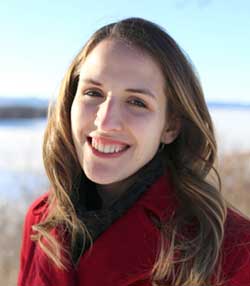Transitioning to Teaching through Mentorship
Elizabeth Rosendale, Holmen High School, Wisconsin
Permanent marker.

Elizabeth Rosendale
As I started working towards my degree in physics education, a professor offered me the opportunity to be a teaching assistant (TA) for his Physics for Elementary Educators class. My job was pretty basic: help groups with lab work, enter student score data, and take notes on the whiteboard while he explained an idea.
It was so simple. Yet there I stood, realizing that I’d just drawn an entire diagram in permanent marker. I picked up the nearest dry erase marker (WHY couldn’t I have seen it minutes earlier!?) and frantically scribbled over my lines. I then took the eraser in my other hand and followed my marks along the board, spastically glancing to the professor to ensure that he hadn’t yet noticed.
A hand went up on my side of the room.
“What are you doing?”
He’s looking at me. Panic. Try to sound confident.
“Well, I accidentally wrote on the board with permanent marker, but the dry erase marker dissolves it.” The class and professor looked interested. While I’d worried about being reprimanded, I discovered that instead, I was being supported.
Teaching is all about scaffolding. We need to give tasks to our students in doses that are equal parts challenging and manageable. Frustrate them, but only a little. Throughout my college career, I was fortunate enough to have amazing professors and mentors who were able to do the same for me, including trusting me to write notes on the whiteboard.
I attended the University of Wisconsin – La Crosse (UWL) to obtain a degree in physics education and minors in chemistry and mathematics. My college journey included rigorous coursework in each of my content areas, as well as in pedagogy. The most beneficial aspect of the program for me, however, was the strong field experience I received and the mentorship component that came with it.
In addition to being a TA in the aforementioned class, I was able to tutor and spend three semesters in four unique classrooms in local middle and high schools. I had varying levels of participation throughout these experiences, but each step of the way, there was a professional mentor to guide my practice and hold conferences with my cooperating teacher.
None of these experiences were easy. In fact, each one brought its own specific dose of terror, whether it be working with middle school students (not my strong suit), writing my first unit plans and tests, mixing chemicals for a class lab, or discovering that my teaching philosophy contradicted that of my cooperating teacher. But through these experiences, I struggled, I learned, and I fell in love with the job.
The questions don’t stop at graduation. I had the good fortune of being hired in one of the districts where I had student taught. During the first year, my goal was to survive while learning as much from my coworkers as possible. By the summer, however, I was starting to feel more confident in my abilities. Then, I was asked to teach the Advanced Placement Physics course, and the following year I helped start our school’s robotics team.
When I began teaching, the district appointed me one trained “mentor” within the school, but I adopted many unofficial mentors along the way, including my physics teacher colleague, whomever happened to be the in teachers’ lounge after a lesson flopped, my mentors from UWL, and an online community of AP Physics teachers. While I’m only a few years in, each year has been even more rewarding, but also significantly more demanding, than the last. Fortunately, much like my experiences in college, the challenges are scaffolded, and each step of the way there was an encouraging mentor to listen, support, and guide me through it.
Elizabeth Rosendale earned her BS in Physics Education with Chemistry and Mathematics minors at the University of Wisconsin-La Crosse. She is a third-year teacher who currently teaches Physics and AP Physics at Holmen High School in Holmen, Wisconsin and helped start the school’s robotics team. She enjoys the outdoors, running, and the incessant wit of her students.
Disclaimer – The articles and opinion pieces found in this issue of the APS Forum on Education Newsletter are not peer refereed and represent solely the views of the authors and not necessarily the views of the APS.
